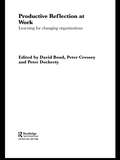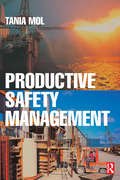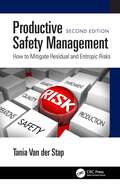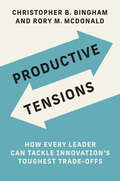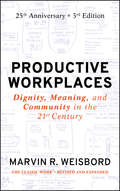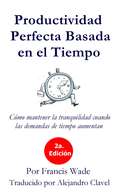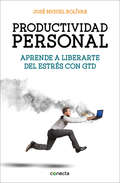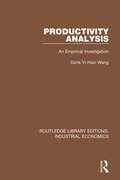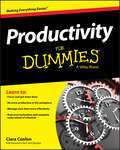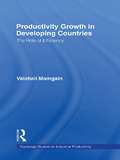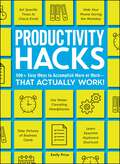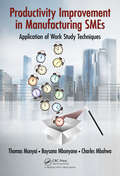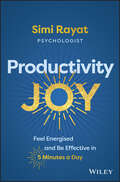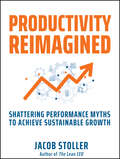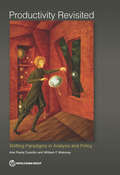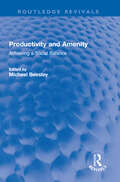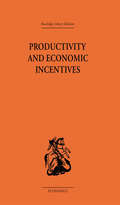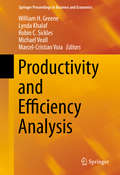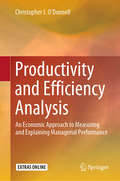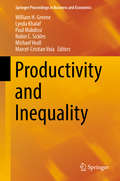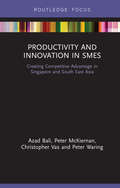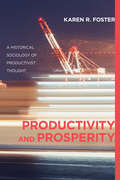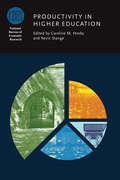- Table View
- List View
Productive Reflection at Work: Learning for Changing Organizations
by David Boud Peter Docherty Peter CresseyThis book is an accessible entry point into the theory and practice of work reflection for students and practitioners. Taking a cross-disciplinary approach, it covers management, education, organizational psychology and sociology, drawing on examples from Europe, the Middle East, North America and Australia. It traces reflection at work from an emphasis on training, through a focus on how organizations learn, to a concern with the necessary learning groups to operate effectively. It emphasizes productivity combined with satisfying lived experience of work life and points the way to a new collective focus on learning at work.
Productive Safety Management: A Strategic, Multi-disciplinary Management System For Hazardous Industries That Ties Safety And Production Together
by Tania MolUnlike most books on this subject, Productive Safety Management, described in this book, integrates occupational health and safety, human resource management, environmental management, and engineering to provide a whole-business approach to effective safety management.The book helps companies to reduce and manage risk by providing, analysing and improving systems in place within the company. It also looks at how external factors can affect company decision making and provides a tool to make sure that a health and safety management system is strategically aligned, appropriately resourced, and that it maximises employee commitment. Chapters on human resource management explore cultural issues and explain how to gain commitment to company objectives.The book has been written for managers and supervisors working in hazardous industries, OHS practitioners, undergraduate and postgraduate students.
Productive Safety Management: How to Mitigate Residual and Entropic Risks, Second Edition
by Tania Van der StapThis book discusses the realm of operational risk management, exploring the intricacies of managing safety, production and quality simultaneously. It offers a fresh perspective on the dynamic and complex nature of risk, highlighting the ever‑changing landscape that organisations must navigate. The reliance on current understandings of residual risk is deficient, particularly as systems of production are prone to degradation over time. This degradation leads to an increase in ‘entropic risk’, resulting in losses in daily production that, if left unchecked, could culminate in catastrophic consequences.Productive Safety Management, second edition utilises practical experience to offer context and application to the concepts surrounding risk that are introduced. It explores the residual and entropic risks present in production systems before shifting focus to the same risks within organisational elements such as leadership, competencies, management systems and resilience. The degradation of these factors can lead to a toxic enterprise culture. Traditional risk management methods have resulted in the creation of functional silos. This book advocates for a multidisciplinary approach, positioning it as essential reading for the Fourth Industrial Revolution. In this era, the ability to effectively manage risks and capitalise on opportunities will be crucial for operational success.This comprehensive title is designed for operational managers and supervisors, and risk‑related professionals in engineering, OSH, environment and quality management.Tania Van der Stap spent the last 20 years since writing the first edition of Productive Safety Management in managerial and technical positions responsible for safety, health and environmental management. Having experience in staff and contractor roles means she understands how to achieve results, whether within the organisation, owners’ team, project team or as an external technical expert. The industries and organisations she’s worked in have been diverse – gas, mining, exploration, construction, rail transport, engineering, agribusiness, professional organisations and regulatory authorities. She has in‑depth knowledge of different strategies according to each organisation’s level of maturity, leadership capability, resource availability and most importantly, the operational reality of the enterprise. Tania’s qualifications are in commerce, which have throughout her career resulted in a business lens on operational performance. She is an unequivocal advocate of a risk‑ and opportunity‑based approach to HSE, production and quality.
Productive Tensions: How Every Leader Can Tackle Innovation’s Toughest Trade-Offs (Management on the Cutting Edge)
by Christopher B. Bingham Rory M. McDonaldHow leaders can recast innovation&’s toughest trade-offs—efficiency vs. flexibility, consistency vs. change, product vs purpose—as productive tensions.Why is leading innovation in today&’s dynamic business environment so distressingly hit-or-miss? More than 90 percent of high-potential ventures don&’t reach their projected targets. Surveys show that 80 percent of executives consider innovation crucial to their growth strategy, but only 6 percent are satisfied with their innovation performance. Should leaders aim for Steve Jobs-level genius, shower their projects with resources, or lean in to luck and embrace uncertainty? None of the above, say Christopher Bingham and Rory McDonald. Drawing on cutting-edge research and probing interviews with hundreds of leaders across three continents, in Productive Tensions Bingham and McDonald find that the most effective leaders and successful innovators embrace the tensions that arise from competing aims: efficiency or flexibility? consistency or change? product or purpose? Bingham and McDonald spotlight eight critical tensions that every innovator must master, and they spell out, with dozens of detailed examples of both success and failure, how to navigate them. How do you excite customers about a product they&’ve never imagined? When is it wise to accept what the data is telling you, and when should you ignore the data and plow forward anyway? How can you maintain stakeholders&’ trust and support during radical unforeseen course corrections? Bingham and McDonald guide readers through innovation&’s thorniest tensions, using examples drawn from the experience of organizations as varied as P&G, Instagram, the US military, Honda, In-N-Out Burger, Slack, Under Armour, and the snowboarding company Burton.
Productive Workplaces
by Marvin R. WeisbordStrategy and Business 2012 Organizational Culture Book of the YearThis third edition of the classic resource, Productive Workplaces is smart, well-written and well-researched, thoughtful, somewhat provocative, and a one-of-a-kind review of the integration of economics, technology, and people. It covers such topics as: the work on self as integral to organizational change; the revision of Lewinian concepts for a new era; and the history behind "getting everybody improving whole systems" as a response to fast change and increasing diversity (not the same as using any particular method). The themes, case studies (many revisited), and models are as relevant as ever.
Productividad Perfecta Basada en el TIempo
by Alejandro Clavel Francis WadeProductividad Perfecta Basada en el Tiempo es un libro esencial para toda aquella persona que enfrenta el reto de la sobrecarga de información. Dada la gran cantidad de tecnologías a nuestra disposición, la adecuada gestión de las “demandas de tiempo” es un factor crítico para lograr el éxito como profesional. Las autoevaluaciones y las escaleras de mejora permiten diseñar un plan maestro que constituye la base de un sistema basado en estándares de clase mundial que te ayudarán a alcanzar un nivel de productividad sostenible y en constante evolución, acorde a los tiempos actuales.
Productividad personal: Aprende a liberarte del estrés con GTD
by José Miguel BolivarUn sistema práctico de organización del trabajo que nos permite reducir el estrés, conseguir los resultados que deseamos, y que nos hace más eficaces en todos los aspectos de la vida. Productividad personal plantea como punto de partida el hecho de que la naturaleza del trabajo ha cambiado profundamente en la era de la información. Nuestras tareas ya no resultan evidentes y no sabemos bien cuándo están finalizadas; tampoco son estables ni predecibles, y lo que es más importante, no son proporcionales al tiempo que disponemos para hacerlas. Todo es nuevo más a menudo. Estos cambios han generado una situación de estrés creciente y general entre todos nosotros. Con demasiada frecuencia tenemos el sentimiento de que algo no va bien y que nos causará problemas, pero no sabemos ni de qué se trata, ni cuándo puede estallar y menos aún qué consecuencias puede tener. La metología GTD (creada por David Allen) parte del principio de que una parte importante de este estrés procede de los «compromisos mal gestionados». José Miguel Bolívar propone el uso de este método muy práctico para evitar que nuestra gestión dependa de la memoria, que es muy poco fiable, y nos introduce de forma muy sencilla y asequible en la fórmula GTD para la productividad personal, basada en herramientas para mantener el control de nuestras tareas y la perspectiva necesaria para tener claras las consecuencias a corto, medio y largo plazo de las decisiones que tomas.
Productivity Accounting
by C. A. Knox Lovell Emili Grifell-TatjéThe productivity of a business exerts an important influence on its financial performance. A similar influence exists for industries and economies: those with superior productivity performance thrive at the expense of others. Productivity performance helps explain the growth and demise of businesses and the relative prosperity of nations. Productivity Accounting: The Economics of Business Performance offers an in-depth analysis of variation in business performance, providing the reader with an analytical framework within which to account for this variation and its causes and consequences. The primary focus is the individual business, and the principal consequence of business productivity performance is business financial performance. Alternative measures of financial performance are considered, including profit, profitability, cost, unit cost, and return on assets. Combining analytical rigor with empirical illustrations, the analysis draws on wide-ranging literatures, both historical and current, from business and economics, and explains how businesses create value and distribute it.
Productivity Analysis: An Empirical Investigation (Routledge Library Editions: Industrial Economics #26)
by Doris Yi-Hsin WangOver the past several years, productivity improvement has become an increasingly vital economic issue for economies and individual firms. This book, first published in 1996, examines empirically relationships between changes in catalyst financial commitments (ie, research and development projects and capital improvements) and productivity/profitability changes, and relationships between productivity changes and profitability changes in selected manufacturing industries and companies.
Productivity Convergence
by Edward N. WolffA vast new literature on the sources of economic growth has now accumulated. This book critically reviews the most significant works in this field and summarizes what is known today about the sources of economic growth. The first part discusses the most important theoretical models that have been used in modern growth theory as well as methodological issues in productivity measurement. The second part examines the long-term record on productivity among Organization for Economic Co-operation and Development (OECD) countries, considers the sources of growth among them with particular attention to the role of education, investigates convergence at the industry level among them, and examines the productivity slowdown of the 1970s. The third part looks at the sources of growth among non-OECD countries. Each chapter emphasizes the factors that appear to be most important in explaining growth performance.
Productivity For Dummies
by Ciara ConlonTake your productivity to the next level and make the most of your time! Do you have too much to do and not enough time to do it? Don't we all! Productivity For Dummies shows you how to overcome this common problem by tackling key issues that are preventing you from remaining focused and making the most of your time. This insightful text gets to the root of the problem, and shows you how to identify and analyse the items on your to-do list to deliver on deadlines and maximise your schedule. Numerous techniques and technologies have been developed to address productivity needs, and this resource shows you which will work for your situation. Productivity is crucial to your success - whether you want to find a new job, earn a promotion you've had your eye on, or generally progress in your career, understanding how to improve your productivity is essential in increasing the value you bring to your organisation. At the very least, increased productivity means that you get things done faster—which translates into fewer overtime hours and more time concentrating on the things that are most important to you. Eliminate procrastination and laziness from your daily routine Organise your work environment to create a space conducive to productivity Increase your concentration and stay focused on the task at hand Make decisions quickly, and stay cool, calm, and collected no matter what the situation is Productivity For Dummies helps you solve the age-old problem of having too much to do and not enough time to do it.
Productivity Growth in Developing Countries: The Role of Efficiency (Studies on Industrial Productivity: Selected Works)
by Vaishali MamgainThis work combines an empirical analysis of productive efficiency change in Newly Industrializing Countries with a theoretical growth model that explores the implications of improvements in productive efficiency on the growth rate of an economy.
Productivity Hacks: 500+ Easy Ways to Accomplish More at Work--That Actually Work! (Life Hacks Series)
by Emily PriceImprove your productivity, increase focus, and enhance your organizational and time management skills with these 500+ easy tips and tricks for getting more stuff done. We all know about Post-It notes and to-do lists—and now, with this handy guide you can take productivity to the next level! Learn to use technology to your advantage, schedule your time wisely, and organize your materials for maximum efficiency. Some of Productivity Hacks&’s easy-to-implement tips include utilizing &“do not disturb&” features on your phone and computer to avoid distractions, scheduling a specific time to check your email instead of shifting focus again and again, and creating templates for your most-used email responses so you don&’t need to do the same work twice—and many more! From accomplishing more in the workplace to maintaining a healthy work-life balance, these tips will help hone your focus and time management skills in simple, manageable steps. You&’ll be amazed how much more you can achieve over the course of a day!
Productivity Improvement in Manufacturing SMEs: Application of Work Study
by Charles Mbohwa Thomas Thinandavha Munyai Boysana Lephoi MbonyaneThis book focuses on the application of workstudy in productivity of manufacturing SMEs locally and abroad and also explores various industrial problems which face manufacturing SMEs in developing and underdeveloped countries in the rest of the world. Low productivity is currently a serious challenge facing manufacturing SMEs, where these SMEs are operating below expected production output levels which makes it difficult for them to compete in the global market. SMEs are the engine drivers of economic growth, one of which is manufacturing. The challenge is that government from various countries in developing and underdeveloped countries, mandated agencies in their respective areas, to ensure that there is economic progress for these SMEs, but productivity remains low in the manufacturing SMEs. When SMEs do not perform well, productivity of manufacturing SMEs declines and unemployment increases. Thus, an increase in unemployment results in a drop of GDP in the country and can become a global and economic crisis. This book describes a process which enables the reader to use effective knowledge that addresses problems facing the productivity of manufacturing SMEs such as work study tools and case studies and provides solutions and applications to improve the running of the manufacturing SMEs in growing their productivity.
Productivity Joy: Feel Energised and Be Effective in 5 Minutes a Day
by Simi RayatStart your day feeling energised, focused and ready to conquer your goals What’s holding you back from being your most productive self? Do you often feel like you’re surviving, rather than thriving? If you’re overwhelmed, unfulfilled or burnt out, you need to discover Productivity Joy. Whether you’re a professional, an entrepreneur, a parent or a student, this step-by-step guide will show you how to embrace a life filled with purpose and passion. In Productivity Joy, psychologist and leadership coach Simi Rayat shares her proven, science-backed 5Q formula — supported by practical solutions and real-world examples — to help you boost your productivity. Inside, you’ll learn how to assess your current emotions, to set goals based on your values and to prioritise in a way that honours your time. All it takes is just 5 minutes a day to create a joy-filled, productive life. Productivity Joy will take you on a journey to: Overcome procrastination and stay focused Gain energy and foster gratitude Increase your effectiveness and feel purposeful Show up as the best version of yourself Craft your day for maximum impact To conquer every day, you need to harness your emotions and your focus. This game-changing book offers the key to unlocking your full productivity power, priming you to feel accomplished, energised and intentional each day. ‘A must-read – Simi’s evidence-based 5Qs Formula helps transform busy professionals, helping you achieve more of what matters, with more joy!’ — Shadé Zahrai, co-founder of Influenceo Global and Peak Performance Educator for Fortune 500s ‘Simi touches the human soul and heart without judgement. Her 5Q approach is simple and practical and helps you design your day for impact and joy.’ — Elif Kaypak, VP Global Marketing, Coca-Cola Brand ‘A fantastic tool for any busy professional looking to optimise their experience of, and output from, their working life. I have found the simple and pragmatic framework invaluable in helping me to continue to become the professional, leader, and person I aspire to be.’ — Chris Jewel-Clark, Legal and General Plc 9781394282210
Productivity Reimagined: Shattering Performance Myths to Achieve Sustainable Growth
by Jacob StollerEscape common business myths to unleash game-changing productivity Written by Shingo Prize winner Jacob Stoller, Productivity Reimagined shows how most companies are constrained by deeply engrained myths that prevent employees from reaching their full productive potential, causing frustration, poor decisions, and disappointing results. Evidence is drawn from Toyota and dozens of other companies that have countered these myths to build strong collaborative cultures and achieve sustainable growth. Arguments are reinforced by the latest science on human behavior and systems theory and supported by more than 60 interviews from prominent CEOs, consultants, academics, executive directors, and EVPs in the context of today's pressing global issues, including labor shortage, income inequality, job-related stress, supply chain instability, and climate change. In this book, readers will learn: Why we are facing a global productivity crisis despite what the news media are telling us Why frontline employees aren't to blame for low productivity, and that the boss doesn't always know best Why the whole does not equal the sum of the parts, and that the past doesn't necessarily determine the future Why a strong workplace culture is the essential enabler for high productivity, and how to instill it As companies face the new realities of the global economy, Productivity Reimagined is an essential resource for forward-thinking executives, managers, and business leaders looking to solve the productivity puzzle and empower their workforces to perform at their best.
Productivity Revisited: Shifting Paradigms in Analysis and Policy
by William F. Maloney Ana Paula CusolitoProductivity has again moved to center stage in two critical academic and policy debates: the slowing of global growth amid spectacular technological advances, and developing countries’ frustratingly slow progress in catching up to the technological frontier. Productivity Revisited brings together the new conceptual advances of 'second-wave' productivity analysis that have revolutionized the study of productivity, calling much previous analysis into question while providing a new set of tools for approaching these debates. The book extends this analysis and, using unique data sets from multiple developing countries, grounds it in the developing-country context. It calls for rebalancing away from an exclusive focus on misallocation toward a greater focus on upgrading firms and facilitating the emergence of productive new establishments. Such an approach requires a supportive environment and various types of human capital--managerial, technical, and actuarial--necessary to cultivate new transformational firms. The book is the second volume of the World Bank Productivity Project, which seeks to bring frontier thinking on the measurement and determinants of productivity to global policy makers.
Productivity and Amenity: Achieving a Social Balance (Routledge Revivals)
by Michael BeesleyProductivity and Amenity (1974) considers social responsibility in business and the balance between the social requirements for enhancing productivity and amenity. It looks at the changing roles of government and business and the nature of modern capitalism; the criteria for social performance ; the role of technological development; and the educational needs for responsible corporate leadership.
Productivity and Economic Incentives
by J. P. DavidsonAs the controversies surrounding performance related pay have demonstrated, reward management is a key issue. Collecting the results of 'fieldwork' investigations in factories and retail outlets, this book measures output before and after a change in methods of remuneration. The link between productivity and stress is explored and conclusions drawn. An introductory chapter, by the eminent economist P. Sargant Florence summarises previously published productivity studies.
Productivity and Efficiency Analysis
by William H. Greene Lynda Khalaf Robin Sickles Michael Veall Marcel-Cristian VoiaThis proceedings volume examines the state-of-the art of productivity and efficiency analysis and adds to the existing research by bringing together a selection of the best papers from the 8th North American Productivity Workshop (NAPW). It also aims to analyze world-wide perspectives on challenges that local economies and institutions may face when changes in productivity are observed. The volume comprises of seventeen papers that deal with productivity measurement, productivity growth, dynamics of productivity change, measures of labor productivity, measures of technical efficiency in different sectors, frontier analysis, measures of performance, industry instability and spillover effects. These papers are relevant to academia, but also to public and private sectors in terms of the challenges firms, financial institutions, governments and individuals may face when dealing with economic and education related activities that lead to increase or decrease of productivity. The North American Productivity Workshop brings together academic scholars and practitioners in the field of productivity and efficiency analysis from all over the world. It is a four day conference exploring topics related to productivity, production theory and efficiency measurement in economics, management science, operations research, public administration, and related fields. The papers in this volume also address general topics as health, energy, finance, agriculture, utilities, and economic dev elopment, among others. The editors are comprised of the 2014 local organizers, program committee members, and celebrated guest conference speakers.
Productivity and Efficiency Analysis: An Economic Approach to Measuring and Explaining Managerial Performance
by Christopher J. O'DonnellThis book provides a coherent description of the main concepts and statistical methods used to analyse economic performance. The focus is on measures of performance that are of practical relevance to policy makers. Most, if not all, of these measures can be viewed as measures of productivity and/or efficiency. Linking fields as diverse as index number theory, data envelopment analysis and stochastic frontier analysis, the book explains how to compute measures of input and output quantity change that are consistent with measurement theory. It then discusses ways in which meaningful measures of productivity change can be decomposed into measures of technical progress, environmental change, and different types of efficiency change. The book is aimed at graduate students, researchers, statisticians, accountants and economists working in universities, regulatory authorities, government departments and private firms. The book contains many numerical examples. Computer codes and datasets are available on a companion website.
Productivity and Inequality (Springer Proceedings In Business And Economics)
by William H. Greene Lynda Khalaf Michael Veall Marcel-Cristian Voia Robin C. Sickles Paul MakdissiThe volume highlights the state-of-the-art knowledge (including data analysis) of productivity, inequality and efficiency analysis. It showcases a selection of the best papers from the 9th North American Productivity Workshop. These papers are relevant to academia, but also to public and private sectors in terms of the challenges that firms, financial institutions, governments, and individuals may face when dealing with economic and education related activities that lead to increase or decrease of productivity. The volume also aims to bring together ideas from different parts of the world about the challenges those local economies and institutions may face when changes in productivity are observed. These contributions focus on theoretical and empirical research in areas including productivity, production theory and efficiency measurement in economics, management science, operation research, public administration, and education. The North American Productivity Workshop (NAPW) brings together academic scholars and practitioners in the field of productivity and efficiency analysis from all over the world, and this proceedings volume is a reflection of this mission. The papers in this volume also address general topics as education, health, energy, finance, agriculture, transport, utilities, and economic development, among others. The editors are comprised of the 2016 local organizers, program committee members, and celebrated guest conference speakers.
Productivity and Innovation in SMEs: Creating Competitive Advantage in Singapore and South East Asia (Routledge Focus on Environment and Sustainability)
by Peter McKiernan Azad Bali Christopher Vas Peter WaringThis book analyses the determining factors behind productivity and innovation amongst Small and Medium Enterprises (SMEs) in Singapore, and within the context of South East Asia, in order to offer recommendations for increasing productivity and aiding economic growth. SME firms are an influential driver of economic growth in advanced world economies like the USA, Germany, Japan and South Korea. Throughout the 2000s, Singapore experienced a decline in economic growth which was linked to decreasing productivity in its SMEs. The decline triggered a transformational policy by a Government intent on forging a ‘high skill–high productivity’ future. Given substantial evidence that low productivity growth occurred in sectors where immigrants dominated the workforce, the seeds of recovery focused on improving productivity and innovation amongst SMEs in those sectors. Hence, this book investigates the factors determining productivity amongst SMEs across the manufacturing sector. It utilises personal interviews with global experts and CEOs, combined with primary data collected from a major international Delphi survey, and interviews with 215 SME owners and managers in Singapore. This data helps us to better understand how these productivity-enhancing factors can be used to increase performance amongst SMEs. By investigating the nature and process of total factor productivity in Singapore’s SMEs, this book tells the policy story behind the revolution. To provide a comparative analysis, Singapore’s story is placed within a South East Asian context. The unfolding narrative contains important lessons for policy makers and industry globally, as they assess the strategic choices available to them for improving productivity and innovation. This book will be of great interest to students and scholars of innovation and productivity, as well as economic development officers, government policy advisors, SME business managers and sustainable businesses.
Productivity and Prosperity: An Historical Sociology of Productivist Thought
by Karen R. FosterDespite Canada's economic success over the past thirty years, the country's ranking in productivity has continued to decline when compared to other industrialized nations. Economic experts and pundits repeatedly call for means of improving productivity, arguing that it is the lynchpin to prosperity. However, there is growing evidence to the contrary. In Productivity and Prosperity, Karen Foster zeroes in on the paradox of productivity: that it is the key to economic prosperity and yet its connection to well-being and median incomes has all but disappeared. Drawing together three case studies including the development of Statistics Canada, the National Productivity Council, and the evolution of the Atlantic Canada Opportunities Agency, Foster argues that there is a 'productivist regime' guiding policy development in Canada and abroad. By analyzing and critiquing the inherent assumptions of productivism the author destabilizes the myth that economic growth is essential for quality of life.
Productivity in Higher Education (National Bureau of Economic Research Conference Report)
by Caroline M. Hoxby Kevin StangeHow do the benefits of higher education compare with its costs, and how does this comparison vary across individuals and institutions? These questions are fundamental to quantifying the productivity of the education sector. The studies in Productivity in Higher Education use rich and novel administrative data, modern econometric methods, and careful institutional analysis to explore productivity issues. The authors examine the returns to undergraduate education, differences in costs by major, the productivity of for-profit schools, the productivity of various types of faculty and of outcomes, the effects of online education on the higher education market, and the ways in which the productivity of different institutions responds to market forces. The analyses recognize five key challenges to assessing productivity in higher education: the potential for multiple student outcomes in terms of skills, earnings, invention, and employment; the fact that colleges and universities are “multiproduct” firms that conduct varied activities across many domains; the fact that students select which school to attend based in part on their aptitude; the difficulty of attributing outcomes to individual institutions when students attend more than one; and the possibility that some of the benefits of higher education may arise from the system as a whole rather than from a single institution. The findings and the approaches illustrated can facilitate decision-making processes in higher education.
